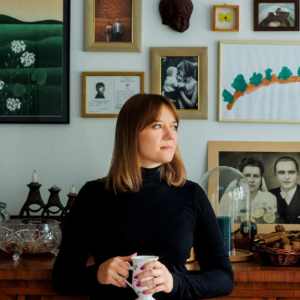Monika Glosowitz currently works as Assistant Professor at the University of Silesia. She has recently published “Maszynerie afektywne. Literackie strategie emancypacji w najnowszej polskiej poezji kobiecej” [Affective Machineries. Literary Strategies of Emancipation in the Contemporary Polish Women’s Poetry] (IBL PAN, 2019), edited “Opowieści kobiet z rodzin górniczych” [Memoirs of Women from Mining Families] (Wydawnictwo Biblioteki Śląskiej, 2024), and co-edited the volumes “Imagined Geographies. Central European Spatial Narratives between 1984 and 2014” (ibidem Press 2018), “Dyskursy gościnności. Etyka współbycia w perspektywie późnej nowoczesności” [Discourses of Hospitality. The Ethics of Coexistence in the Late Modernity Perspective] (IBL PAN, 2018) and special volumes of “The Polish Journal of Aesthetics” (2018, vol. 51), “Central Europe” (2017, vol. 15).
She specializes in literary studies, with an additional research interest in feminist theories, deindustrialization studies and environmental humanities. She has started her new research project that interrogates the invisibility of women in narratives of coal areas in Poland.
She has been awarded with Poznań Literary Award – Stanisław Barańczak’s Scholarship in 2020.
She holds PhDs from the Universities of Silesia and University of Oviedo, MAs in gender studies (University of Utrecht and University of Granada).
ORCID ID: 0000-0001-6059-4224
ResearchGate | Google Scholar | Academia.edu
Project Statement:
Narratives of Women from Mining Families
The challenge of the project is to re-establish women in the cultural memory of the region and it is certainly relevant to the local community. Nevertheless, I see it also as a part of a line of transnational research in which researchers are undertaking a reinvention effort to restore the memory of women from mining families in other coal regions.
The first stage (2022) of the project was a call for writing and oral history workshops, followed by an open call for competition entries. The second stage (2022) was a continuation and complementary part to the first — it developed the objects that were unusable in the narrative competition into their material dimension by means of an exhibition. It presented everyday items from the domestic spaces in which women functioned. These were accompanied by a series of portrait photographs made by Karolina Jonderko (World Press Photo 2021) of the participants and their stories recorded by the sound researcher Agnieszka Lniak.
The third stage (2023) of the project involved an open call for memoirs, this time aimed at women living throughout the Silesian province and the fourth one is yet another edition of the call (2024). In all four stages, belonging to a mining family has been defined at the intersection of two axes: gender and relationship to workers in the mining industry or one’s own professional activity in the industry. The final output of the project so far is a book of “Memoirs of Women from Mining Families” (Publishing House of Silesian Library 2024). It is a collection of 24 stories told by 22 women.
A micro-historical perspective of oral history against the backdrop of global, European, state narratives of the economic transformation of coal regions is the tool that will provide insight into the experiences of communities and individuals whose voice has been marginalized or even excluded from that dominant discourse.





